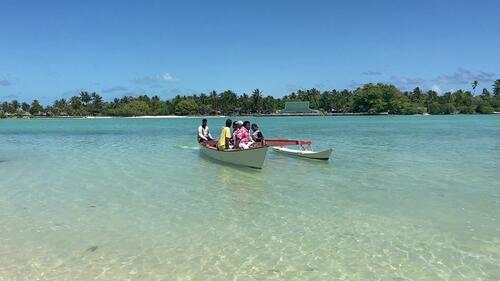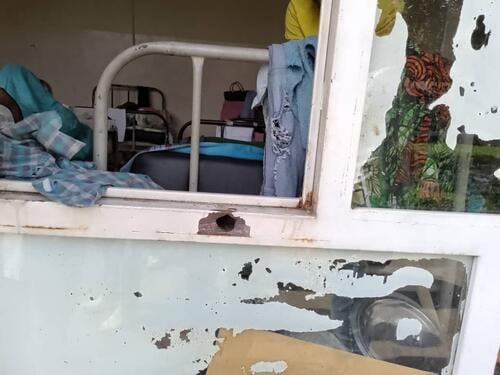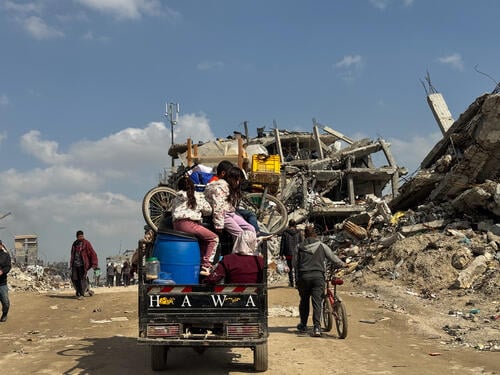Kiribati is one of the most remote and geographically dispersed countries in the world. It is also one of the most vulnerable countries to the impacts of the climate crisis. The country faces what is described as a triple threat to health: communicable diseases, non-communicable diseases (NCDs), and the health impacts of climate changeWorld Health Organization.
Climate and environmental changes are exacerbating Kiribati’s high burden of disease. Kiribati faces air and sea temperature rises, storm surges and high winds, erosion, drought and flooding. This poses direct and indirect threats to human health, including injury, disease outbreaks and malnutrition.
In June 2022, Kiribati’s government declared a state of emergency because of prolonged drought. Kiribati’s water table sits on top of the sea water and underneath the coral island, making it prone to salinisation. The water table is replenished by rainfall but when the rain doesn’t come, people’s access to clean water becomes limited.
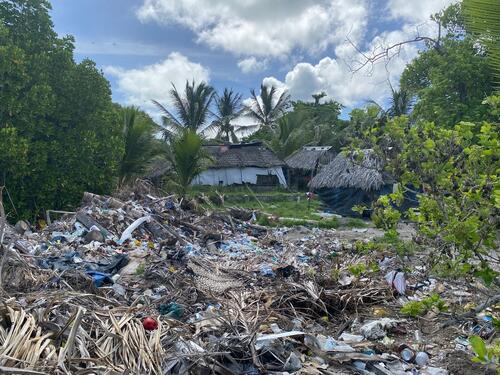
“The water in the wells is becoming more brackish [salty] so it's no longer suitable for drinking,” says Dr Jo Clarke, Médecins Sans Frontières (MSF) paediatrician. “Lack of fresh water makes sanitation in the community more difficult, heightens the risk of diarrhoea and skin infections and makes it harder to grow food.”
Food and water security are chronic problems
Kiribati people (known as i-Kiribati) have high rates of obesity but conversely MSF teams have been seeing more and more malnourished children.
“What is striking compared to other countries I have worked in where there has been malnutrition, is that many adults here are overweight,” says Dr Clarke.
That’s the other end of poor nutrition; large numbers of people with diet-related NCDs such as type-two diabetes. It’s difficult to grow fruit and vegetables here and accessing healthy, nutritious food is not easy. Most food is imported, and it’s high in fat and sugar,” she says.
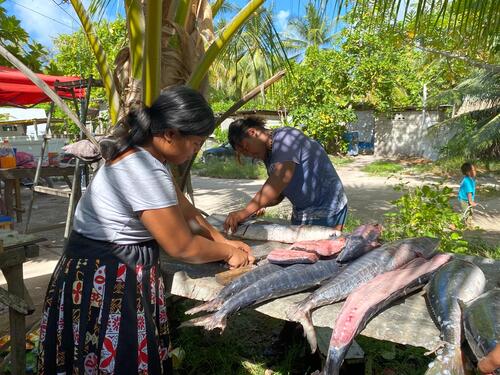
Burden of disease
Kiribati’s health burden is complex. The prevalence of communicable diseases such as tuberculosis and leprosy are some of the highest in the PacificTB & Leprosy in Kiribati. The country faces a non-communicable disease crisis with the second highest rates, among low-middle income countries, of premature deaths due to type-two diabetesInternational Fund for Agricultural Development and ratesUNICEF are also ranked some of the highest in the region.
“The burden of diseases is immense for such a small country,” says Dr Tinte Itinteang, Kiribati’s Minister of Health and Medical Services. “Maternal mortality, is one of the worst in the region and infant mortality is about 10 times that of Australia and New Zealand. These things have not happened overnight and some of them have been getting worse over the last 10 years.”
The tyranny of size
Kiribati only has a population of 120,000 people, half of whom live on one island, South Tarawa, which is also where the capital, Tarawa, is located. The remainder live on the outer islands, of which there are 33 in total.
Kiribati’s size and its remoteness impact the government’s ability to provide comprehensive healthcare. One of its biggest obstacles is the lack of qualified medical personnel.
What is striking compared to other countries I have worked in where there has been malnutrition, is that many adults here are overweight.Dr Jo Clarke, MSF paediatrician
The country lost 30 of its most experienced nurses to labour mobility schemes in Australia and New Zealand over the last 12 months and many of its doctors migrate to other countries for professional opportunities.
“We’ve had doctors that never returned from their medical training; they finished their post-graduate training and they just decided to leave Kiribati,” says Dr Revite Kirition, the Director General of Health.
MSF has been working in Kiribati since October 2022, in partnership with the Ministry of Health and Medical Services, to improve maternal and paediatric care.
An MSF paediatrician, obstetrician, midwife and paediatric nurse are working alongside i-Kiribati Ministry of Health staff to provide healthcare in the country’s main hospital and to help build capacity among local health staff. Our teams have also worked on the outer islands, training nurses on neonatal care and screening for women who have high-risk pregnancies due to the very high rates of gestational diabetes.
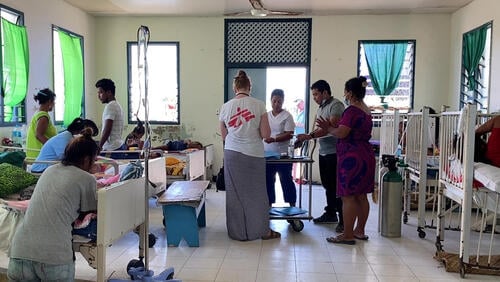
Access to essential medical supplies
Dr Clarke has seen first-hand how difficult it can be for the Ministry of Health and Medical Services to secure the essential medical supplies and drugs that they need.
“There's been a struggle with pharmacy supply and equipment supply. We're quite remote, so it takes a lot of time for something to travel here by boat or by plane. We recently faced a problem with a lack of therapeutic food for malnourished children,” says Dr Clarke.
Moannara Benete, who leads the country’s central medical stores says it is very challenging for Kiribati to access the essential and lifesaving drugs needed in time and at a fair price. “When the F75 and F100 therapeutic milk that we use for malnourished babies finally arrived in Kiribati it had expired, because it took eight months to get here from Europe,” says Benete.
“I don’t think we have procurement or negotiation power. We should work with our Pacific neighbours so we can secure the essential medical supplies we need as a region. It is a critical situation we face, and we need urgent assistance,” she says.



